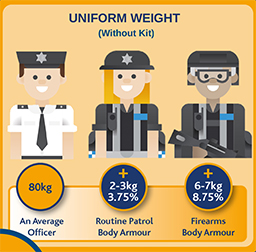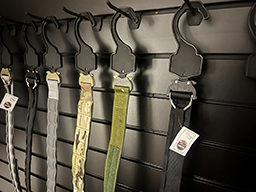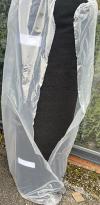POLICE How to look after yourself when wearing Body Armour

When wearing body armor, police officers should follow certain precautions to ensure their safety and effectiveness. Here are some important precautions for police officers to consider:
-
Proper Fit: Ensure that the body armor fits correctly. It should be snug but allow for comfortable movement. Ill-fitting body armor can restrict mobility and impair performance.
-
Regular Inspection: Routinely inspect the body armor for any signs of damage, such as tears, cracks, or loose straps. Damaged armor may not provide the necessary protection, so it should be repaired or replaced promptly.
-
Maintenance: Follow the manufacturer's instructions for cleaning and maintaining the body armor. Keep it clean and free from contaminants that can affect its performance.
-
Training: Police officers should receive proper training on how to wear and use body armor effectively. This includes learning how to adjust and secure the armor properly, as well as understanding its limitations.
-
Layering: Body armor is typically designed to be worn over clothing, so officers should wear appropriate clothing underneath to maximize comfort and protection. Avoid wearing clothing that can interfere with the proper fit of the armor.
-
Temperature Considerations: Body armor can increase body heat, especially in hot weather. It is essential to stay hydrated, take regular breaks, and be aware of any signs of heat-related stress or exhaustion.
-
Tactical Considerations: Body armor does not cover the entire body, so officers should be mindful of protecting vulnerable areas that are not covered. This includes the head, neck, and extremities. Proper training in tactical movements and use of cover is essential.
-
Psychological Preparation: Wearing body armor can create a psychological barrier between officers and the public. Officers should be mindful of maintaining a professional and approachable demeanor despite the added physical protection.
-
Regular Review: Stay updated on the latest advancements in body armor technology and best practices. Regularly review departmental policies and procedures regarding the use of body armor to ensure compliance and effectiveness.
It is important to note that these precautions are general guidelines, and specific departmental policies and regulations should always be followed regarding the use and maintenance of body armor.
If as a Police Officer you would like to have the best fitting, most comfortable armour that can be fitted to all Body Types, get in touch with us here or CL Distribution who can arrange for your department to have a presentation.
Below is the Information given by the UK Police Treatment Centres
Your body armour is designed to protect you from harm but it can be a little heavy and bulky; for example, you can add up to 4kg for routine patrol armour and 7kg for a firearms ballistic armour. Wearing this all day can be demanding for your body and as such you can expect a few aches and pains at the end of the day, and it is important to remember this is entirely NORMAL.
One of the most important things to remember is make sure your body armour fits you properly as this will make it more comfortable to wear.
Some useful tips for wearing body armour are;
Load your kit equally on your body armour and stand with weight even distributed between your feet. Try not to stand with your hands resting in the front of your body armour. Try and adjust your posture (in sitting or standing) every 20mins if possible. When you are standing try to stand to your full height. If you lose or gain significant amounts of weight you should have the armour checked for its fit.
Completing regular exercise can ensure you are fit to perform your daily role and ensure your body has the resilience it needs for the demands of being a Police Officer- remember you need to be fit the whole year not just for your fitness test.
Exercise can take many forms be that going to the gym, running, pilates or yoga to name but a few. It is however suggested that given the demands of the job you do some form of resistance type exercises about twice a week. Again, this does not have to be complicated but will help reduce the fatigue of wearing your body armour all day.












